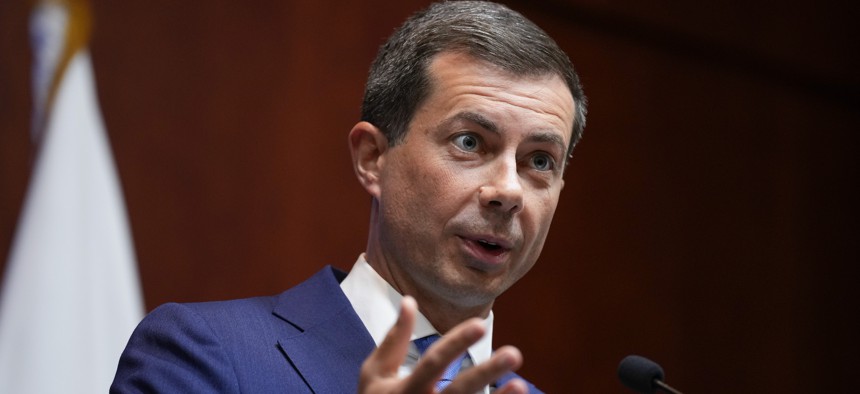The Biden administration looks to spur office-to-housing conversions

Secretary of Transportation Pete Buttigieg announced Thursday new initiative under through the Department of Transportation to support commercial-to-residential conversions. Drew Angerer/Getty Images
The White House launched a multi-agency effort to encourage states and cities to convert more empty office buildings into housing units. It is putting billions of federal dollars behind the announcement.
For the first time in 15 years, the U.S. Department of Housing and Urban Development updated its guidance for the Community Development Block Grant program that funds affordable housing, infrastructure and antipoverty projects. What prompted the update? The growing movement to convert old office space to housing.
The change is part of a suite of announcements the Biden administration made Thursday. They aim to alleviate the country’s affordable housing crisis through commercial-to-residential conversions by transferring underutilized public land to local governments for housing and building more homes near public transit. Office vacancy nationwide recently hit a 30-year high of 18.2%, presenting an “opportunity to both increase housing supply while revitalizing main streets,” said White House National Economic Council Director Lael Brainard on a press call Thursday. “It's a win-win.”
The updated guidance allows cities to use Community Development Block Grants to purchase, rehabilitate and convert commercial properties for mixed-use and housing developments. Cities and states can also receive up to five times their annual grant allocation in low-cost loans for conversion projects.
“We are modernizing the use of our grants to meet the needs of localities and states today,” said HUD Deputy Secretary Adrianne Todman.
It’s not just HUD looking to support conversions. The Department of Transportation issued new guidance on how states, cities and developers can use funds from two programs to support transit-oriented housing—the Transportation Infrastructure Finance and Innovation Act and the Railroad Rehabilitation & Improvement Financing program. Combined, these two programs have over $35 billion in available funds. The department will offer technical assistance to communities looking to leverage the funds for conversions.
The department also issued new rules to make it easier for transit agencies to transfer underutilized properties to local governments, nonprofits or private developers of affordable housing to create more homes.
“Our intention is to make the most of this opportunity to add more housing near transit in ways that not only reduced the cost of housing but also often reduced the cost of transportation,” said Secretary of Transportation Pete Buttigieg, adding that transportation is often a low-income household’s highest expense after housing.
To further support conversions, the White House released a guidebook that outlines more than 20 federal programs across six agencies that can support such projects, including low-interest loans, grants and tax incentives. The Biden administration will host workshops in the coming weeks for state and local governments, builders and lenders about how federal funding can be used for conversion projects.
The announcement builds on the Biden administration’s White House Housing Action Supply plan, which aims to boost the supply and quality of affordable housing nationwide.
“This is a really important set of steps,” Buttigieg said, “and I believe as a result, in a few years, more Americans will be living in newly converted, more affordable, great housing, close to public transit, because of these initiatives by the Biden-Harris administration.”






